Experience the ultimate tropical escape in a showdown between Aruba and St. George’s in Grenada.
Aruba, known as “One Happy Island,” welcomes you with its picturesque landscapes, warm culture, and endless sunshine. Its flat, desert-like landscape is peppered with beautiful white-sand beaches perfect for relaxing and partaking in water sports.
On the other hand, St. George’s, the capital of Grenada, charms you with its red-roofed homes, Georgian architecture, and a horseshoe-shaped harbor. This hilly and lush island is a paradise for nature lovers, with rainforests, waterfalls, and spice plantations to explore.
LocationCaribbean SeaCaribbean Sea
GeographyFlat and aridMountainous and hilly
LanguageDutch, PapiamentoEnglish
GovernmentParliamentary democracyParliamentary democracy
CurrencyAruban florin (AWG)Eastern Caribbean dollar (XCD)
TourismMajor tourist destination, known for beaches and resortsDeveloping tourism industry, popular for natural beauty and historical sites
EconomyTourism, oil refining, offshore bankingAgriculture (spices and cocoa), tourism, nutmeg processing
CultureInfluenced by Dutch, Spanish, and indigenous culturesInfluenced by African, British, and French cultures
AttractionsNatural Bridge, Arikok National Park, Palm BeachGrand Anse Beach, Fort George, Underwater Sculpture Park
ClimateArid tropical climate with consistent trade windsTropical climate with distinct wet and dry seasons
Whether you seek lively nightlife and luxurious resorts or a laid-back experience immersed in history and natural beauty, both Aruba and St. George’s offer captivating adventures that will make your Caribbean dreams come true.
Island Paradise Showdown: Aruba and St. George’s Battle for the Ultimate Tropical Escape
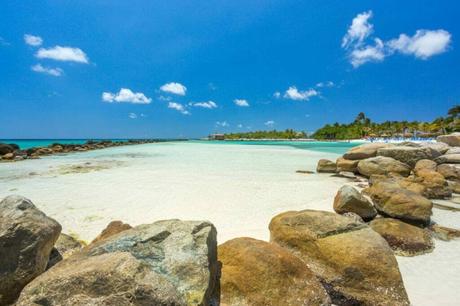
In the turquoise waters of the Caribbean, Aruba, known as “One Happy Island,” invites travelers with its stunning landscapes, gentle breezes, and warm, inviting culture. It’s a flat, desert-like island that’s nestled in the southern Caribbean, showered with constant sunshine and hugged by pristine white-sand beaches.
On the other hand, St. George’s, the capital of Grenada, is a charming town dotted with red-roofed homes, Georgian buildings, and a horseshoe-shaped harbor filled with azure waters. The island is more hilly and lush, with an interior that’s a mix of rainforests, waterfalls, and spice plantations. The spice-scented air adds an extra layer of sensory delight for visitors.
The beach is the main attraction in Aruba, where visitors may soak up the rays, relax in beautiful beachfront resorts, or participate in a variety of water sports. The island comes alive at night with a dynamic nightlife packed with music, dance, and merriment.
In contrast, St. George’s is a destination for those seeking a blend of natural beauty, historic charm, and laid-back lifestyle. Here, you can spend your days exploring spice markets, visiting historic forts, or trekking through the lush rainforest.
Beach Bliss: Comparing Aruba’s White Sands and St. George’s Pristine Shores
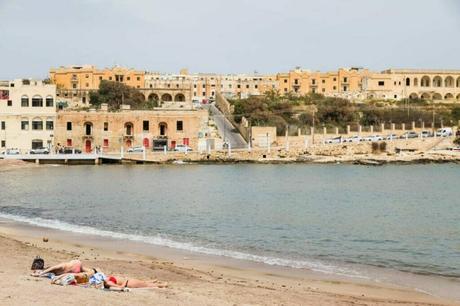
Aruba’s beaches are undoubtedly some of the best in the Caribbean. Think endless stretches of powdery white sands, clear blue waters, and swaying palm trees. Palm Beach and Eagle Beach often top the list of favorites, providing perfect settings for relaxation, swimming, and water sports.
St. George’s also boasts beautiful beaches, but with a slightly different appeal. Grand Anse Beach is the island’s star, with two miles of golden sands backed by a bustling town. The beaches here are quieter and less crowded, offering an air of seclusion that’s often difficult to find in Aruba.
When it comes to water clarity, both locations excel, offering fantastic conditions for snorkeling and diving. However, Aruba’s waters are more tranquil, making it better suited for leisurely swims and novice snorkelers.
In contrast, St. George’s beaches are lined with vibrant coral reefs, teeming with marine life. For divers, St. George’s is a real treat, boasting some of the Caribbean’s most beautiful underwater landscapes.
Cultural Treasures: Unveiling Aruba’s Rich Heritage and St. George’s Historic Charms
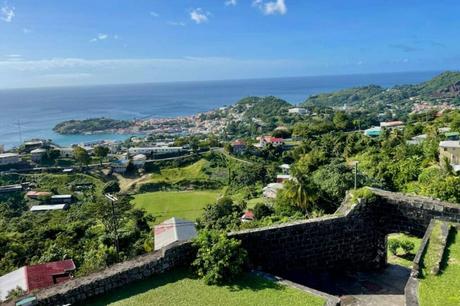
Aruba’s culture is a unique blend of Indigenous, Spanish, Dutch, and African influences. Evidence of this rich cultural tapestry can be seen throughout the island, from the Dutch colonial architecture in Oranjestad to the ancient cave paintings in Arikok National Park.
Contrastingly, St. George’s tells a story of colonial history and Afro-Caribbean heritage. The town’s skyline is defined by the 18th-century Fort George and Fort Frederick, while the winding streets below are filled with historic buildings, churches, and vibrant markets.
Aruba celebrates its culture through various festivals throughout the year, the biggest of which is the Aruba Carnival – a month-long celebration filled with parades, music, and dazzling costumes. You won’t want to miss this party.
St. George’s, on the other hand, commemorates its history through its own unique celebrations. The Grenada Spice Mas Festival is a true cultural extravaganza, featuring traditional music, intricate costumes, and lots of dancing.
Thrill Seeker’s Delight: Aruba’s Adventure Extravaganza vs. St. George’s Natural Wonders

Beyond its gorgeous beaches, Aruba is a haven for adventure seekers. The rugged landscapes of the Arikok National Park offers hiking, cave exploration, and off-roading, while the coast provides excellent conditions for windsurfing, kitesurfing, and deep-sea fishing.
In St. George’s, the adventures are equally exciting but take on a more natural focus. Hiking trails meander through rainforests, leading you to hidden waterfalls and panoramic views. The crystal-clear waters provide opportunities for snorkeling and diving, while the island’s volcanic lake, Lake Antoine, is a sight to behold.
Both Aruba and St. George’s are fantastic destinations for water sports. However, Aruba’s consistent trade winds make it a world-renowned destination for windsurfing and kitesurfing.
On the flip side, St. George’s boasts incredible biodiversity, both on land and underwater. Nature enthusiasts and bird watchers will adore the island’s unusual topography and abundant greenery.
Foodie’s Paradise: Exploring Aruba’s Culinary Scene and St. George’s Local Flavors

Aruban cuisine is as diverse as its culture. Dutch influences blend with Indigenous and Creole flavors to create unique dishes like Keshi Yena (stuffed cheese) and Pastechi (fried pastries). Seafood, understandably, plays a significant role, with dishes like Red Snapper and Mahi Mahi being island favorites.
St. George’s offers a culinary scene that’s deeply rooted in its rich, fertile soils and abundant seas. Fresh seafood, local fruits, and the island’s famous spices are the stars here. Traditional dishes like Oil Down, a flavorful one-pot dish, and the nutmeg-flavored ice cream are must-tries.
Aruba’s food scene is active and diverse, featuring a diverse selection of foreign and local eateries. Dining is often an event here, with live music, beachside locations, and excellent service adding to the experience.
In St. George’s, the food experience is more authentic and laid-back. It’s about roadside food stalls, bustling markets, and family-run eateries. It’s about the joy of discovering flavors and ingredients that you’ve never encountered before.
Choosing Your Dream Destination: Aruba’s Modern Luxuries or St. George’s Unspoiled Serenity?
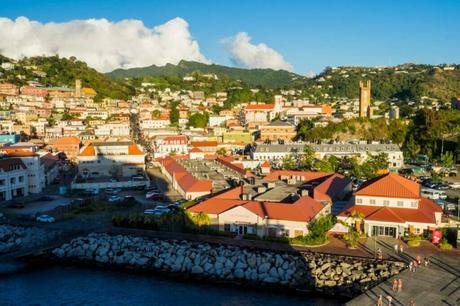
When it comes to planning your dream vacation, the choice between Aruba’s modern luxuries and St. George’s unspoiled serenity can be a delightful challenge. Aruba, a sun-soaked paradise, beckons with its pristine beaches, opulent resorts, and vibrant ambiance, creating a haven for those seeking indulgence and excitement during their getaway.
With its well-developed infrastructure, an array of activities, and reliable weather, Aruba presents a safe and convenient option that caters to the desires of many travelers.
On the other hand, St. George’s offers a distinct and authentic Caribbean experience that resonates with travelers seeking tranquility and a deeper connection to nature. Here, you may relax and unplug from the stresses of daily life by immersing yourself in the local culture and embracing the untouched beauty that surrounds you.
Whether you’re an eco-traveler passionate about preserving the environment or a history enthusiast drawn to the tales of the past, St. George’s will captivate your senses and make an indelible impression on your soul.
Both Aruba and St. George’s share common threads of warm hospitality, delectable cuisine, and captivating histories. Whether you opt for the modern luxuries of Aruba or the untouched serenity of St. George’s, the Caribbean dream you envision is destined to come true.
So, take a moment to reflect on your desires and priorities, and embark on a journey that promises to create cherished memories and fulfill your ultimate vacation aspirations.
FAQ
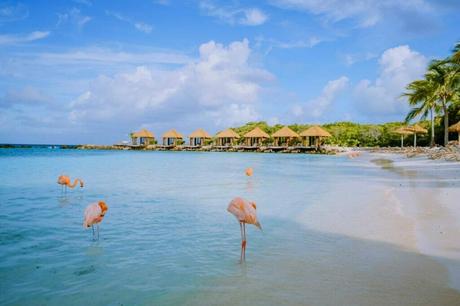
What country is St. George’s island?
St. George’s is not an island, but rather the capital city of Grenada, a Caribbean republic. It is located in the southwestern portion of Grenada, which is part of the West Indies’ Lesser Antilles group of islands.
What is St. George, Grenada known for?
St. George’s, Grenada, is renowned for its picturesque beauty and rich cultural heritage. The city is famous for its stunning horseshoe-shaped harbor, known as the Carenage, which is adorned with colorful buildings and historic landmarks. St. Grenada is renowned as the “Spice Isle” due to its production of nutmeg, cloves, cinnamon, and other spices, and George’s is also known for its spice trade history. Additionally, the city hosts the annual Grenada Carnival, a vibrant celebration of music, dance, and colorful costumes.
Is Grenada or Aruba better?
Comparing Grenada and Aruba is subjective, as both destinations offer unique experiences. Grenada boasts unspoiled natural beauty, including lush rainforests, pristine beaches, and stunning waterfalls. It is ideal for those seeking a tranquil and authentic Caribbean experience immersed in local culture. Aruba, on the other hand, is recognized for its magnificent resorts, active nightlife, and diverse activities. It is a popular choice for travelers seeking a blend of relaxation, entertainment, and modern amenities. The decision between Grenada and Aruba ultimately depends on personal preferences and the desired vacation experience.

